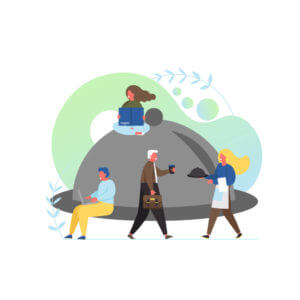Read time: 10 minutes
 Beginning January 1, 2020, bars and restaurants operating in Illinois will be required to comply with new requirements and responsibilities. These requirements are part of the over-arching SB 75, signed in 2019 by Governor Pritzker.
Beginning January 1, 2020, bars and restaurants operating in Illinois will be required to comply with new requirements and responsibilities. These requirements are part of the over-arching SB 75, signed in 2019 by Governor Pritzker.
- Every bar and restaurant must have a sexual harassment policy
- Every bar and restaurant must train all of its employees
- Training and policies must be made in both English and Spanish
- Bars and restaurants face stiff penalties for failing to comply
Policy Requirements
The sexual harassment policy must comply with Illinois’ new sexual harassment laws, sb 75, and include several key components. First, the sexual harassment policy must contain a prohibition against harassment, in which the bar/restaurant explains that the Company recognizes sexual harassment is illegal and prohibits employees from engaging in sexually harassing conduct.
Next, the policy must contain the definition of sexual harassment under Illinois and Federal law. Illinois updated its definition of sexual harassment in SB75, and it reads as follows:
“Sexual harassment” means any unwelcome sexual advances or requests for sexual favors or any conduct of a sexual nature when:
- Submission to such conduct is made either explicitly or implicitly a term or condition of an individual’s employment;
- Submission to or rejection of such conduct by an individual is used as the basis for employment decisions affecting such individual; or
- Such conduct has the purpose or effect of substantially interfering with an individual’s work performance or creating an intimidating, hostile, or offensive working environment. For the purposes of this definition, the phrase “working environment” is not limited to a physical location an employee is assigned to perform his or her duties and does not require an employment relationship.
The federal definition can be found here, and is also provided below:
It is unlawful to harass a person (an applicant or employee) because of that person’s sex. Harassment can include “sexual harassment” or unwelcome sexual advances, requests for sexual favors, and other verbal or physical harassment of a sexual nature.
Harassment does not have to be of a sexual nature, however, and can include offensive remarks about a person’s sex. For example, it is illegal to harass a woman by making offensive comments about women in general.
Both victim and the harasser can be either a woman or a man, and the victim and harasser can be the same sex.
Although the law doesn’t prohibit simple teasing, offhand comments, or isolated incidents that are not very serious, harassment is illegal when it is so frequent or severe that it creates a hostile or offensive work environment or when it results in an adverse employment decision (such as the victim being fired or demoted).
The harasser can be the victim’s supervisor, a supervisor in another area, a co-worker, or someone who is not an employee of the employer, such as a client or customer.
The policy must also contain concrete examples of illegal sexual harassment that commonly occur in bars and restaurants. The policy must explain the bar/restaurant’s internal complaint process that is available to employees and how they can report harassment to supervisors and managers. Illinois is serious about sexual harassment, and to that end, the policy must also include the legal remedies available to employees and the complaint process available to employees through the Illinois Department of Human Rights (IDHR) and its federal counterpart the Equal Employment Opportunity Commission (EEOC).
The policy must include a section on retaliation, explaining that it is illegal for an employer, supervisor, or co-worker to retaliate against an individual for reporting sexual harassment or filing a complaint.
Finally, the policy is required to explain that under Illinois law, all employees are required to participate in sexual harassment training.
One final note on bar & restaurant sexual harassment policies – be sure to have your policy available in both English and Spanish. As you will see below, one of the requirements of sexual harassment training for Illinois bar & restaurants is the training must be available in both English in Spanish. The same requirement applies to your policy document.
Within the first calendar week of employment, restaurants and bars must inform employees about its sexual harassment policy in writing.
Training Requirements
Similar to the content that must be covered in your policy, per sb 75, you must conduct training that covers the following information:
- The definition of sexual harassment
- Examples of conduct that constitutes illegal harassment
- How to file a sexual harassment complaint
- The definition of retaliation and an explanation that retaliation is illegal
- How to report harassment to the IDHR and EEOC
All bars and restaurants must provide employees with supplemental anti-harassment training in English and Spanish. The supplemental portion must include the following:
- Examples of illegal sexual harassment that are common to bars and restaurants
- Manager/Supervisor responsibilities under the law
Under SB 75, harassment training must be given to each employee, every year. Interestingly, the law does not specify when the training must occur, only that is must occur annually.
As noted above, Illinois requires bars and restaurants to provide all new employees with a copy of its sexual harassment policy within a week of hiring. To minimize liability associated with untrained employees, we suggest that they undergo the mandatory training within a similar timeframe. At a minimum, we recommend bars and restaurants in Illinois adhere to California’s requirement to train new employees within six months of hire, though the law in Illinois does not stipulate this explicitly.
Failure to comply can lead to penalties for bars and restaurants between $500 and $5,000 per offense.







